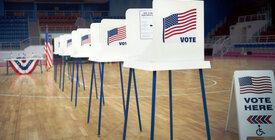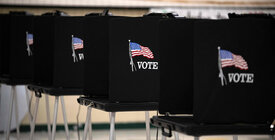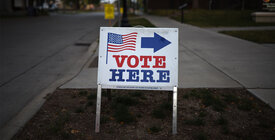Last year, the Brennan Center partnered with VoteRiders, the Center for Democracy and Civic Engagement at the University of Maryland, and Public Wise to survey Americans about what identification they possess and what they know about voter ID laws in their state. We also asked respondents whether they had documents that prove their citizenship — a passport, birth certificate, or naturalization papers — readily available. Our research indicates that more than 9 percent of American citizens of voting age, or 21.3 million people, don’t have proof of citizenship readily available. There are myriad reasons for this — the documents might be in the home of another family member or in a safety deposit box. And at least 3.8 million don’t have these documents at all, often because they were lost, destroyed, or stolen.
We also uncovered evidence of racial disparities in these numbers: while just over 8 percent of self-identified white American citizens don’t have citizenship documents readily available, that number is nearly 11 percent among Americans of color.
Convenience matters when it comes to consistent participation in American elections. Even if a citizen is certain that a passport or birth certificate is in a safety deposit box at the bank, voters are busy; an additional trip to the bank would surely prevent some voters from registering to vote if such documents were required. (We consider a document to be readily available if respondents “could quickly find it if [they] had to show it tomorrow.”)
What’s more, our estimates are probably conservative measures of impact. While it’s true that most Americans can access these documents, most of us don’t walk around town carrying our passport or birth certificate. If those documents were required for voter registration, most would not have them readily available to take advantage of opportunities they encounter at schools, churches, or other community spaces where registration drives register many Americans to vote.
We have known for nearly two decades that many Americans do not have readily available documentary proof of citizenship. In 2006, the Brennan Center published research indicating that 7 percent of Americans didn’t have citizenship documents readily available. In this updated research, we incorporated best practices on surveying hard-to-reach populations. Our updated results are remarkably consistent with those from 2006: like then, millions of Americans would be prevented from registering to vote if they were required to prove their citizenship. More troubling still is our finding that these requirements would fall disproportionately on Americans of color.
The current protections against noncitizen voting are effective: ballots cast by noncitizens are vanishingly rare. Requiring proof of citizenship would solve nothing, but it would create major barriers to registration for eligible voters, especially those who already face disproportionate barriers to participation in our democracy. We should be making it easier, not harder, for these citizens to participate.
Methodology: The survey reached 2,386 US citizens, age 18 or older, between September 12 and October 4, 2023. The survey was conducted using the SSRS Opinion Panel (web and phone calls) and pre-paid cell phone numbers. Two-thousand one-hundred fifty-five SSRS Opinion Panel respondents took the survey on the web, 110 SSRS Opinion Panel respondents took the survey over the phone, and 121 respondents survey took the survey over phone call to pre-paid cells. The margin of error is ± 2.6%. The margin of error among subgroups is larger and varies.
For more on this study and other surveys on who has proof-of-citizenship documents conducted by the University of Maryland Center for Democracy and Civic Engagement, click here.





